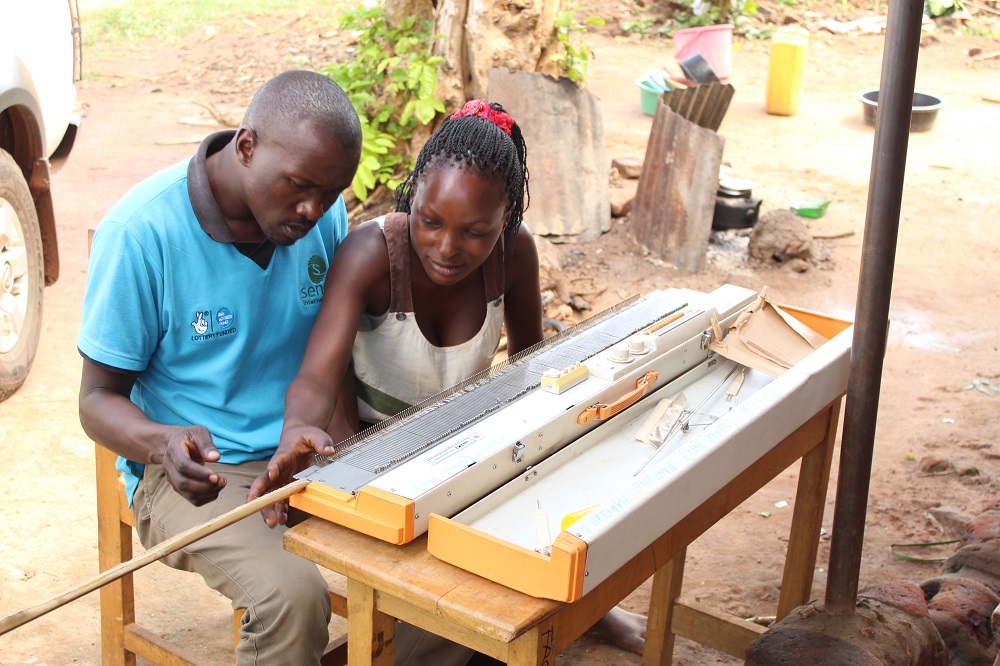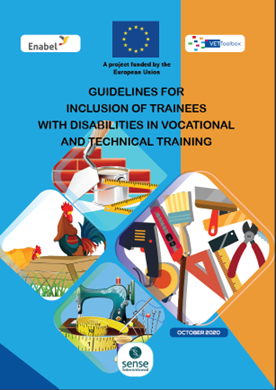
Youth with Complex Disabilities Learn, Work and Earn!
Sense International Kenya (SI Kenya), Kenya, Uganda and Tanzania
Overview
Youth with complex disabilities (YWCD) refers to young people aged between 15-35 with visual and hearing or multi-sensory impairments (MSI) and single sensory impairments combined with additional learning and physical disabilities or autism. Due to poverty, low literacy levels, high support needs, societal exclusion, stigma, challenges with communication and discrimination, YWCD are among the most marginalised and disadvantaged groups in society. Without appropriate support, YWCD are unable to access vocational training and decent work as defined by the Sustainable Development Goals (SDGs) and the International Labor Office (ILO).
The objective of this programme was to improve the employability of 300 YWCDs across Kenya, Uganda, and Tanzania through the acquisition of quality, inclusive vocational and demand driven skills. Objectives included sensitizing parents on job and skill opportunities available for their children and placing the youth into TVET institutions. TVET tutors and Education Assessment and Resource Centre officers at County levels led the process of identification of youth challenges, assessment, and placement of the learners.
The project is implemented by Sense International Kenya, Uganda, and Tanzania, in partnership with six technical and vocational education and training (TVET) institutions: two in Kenya, three in Uganda and one in Tanzania. The project is in its second and final year of implementation and is currently on a four-month extension to February 2022.
Good Practice Approach
The project addresses the lack of capacity amongst TVET institutions to deliver inclusive learning (lack of inclusive curricula, inaccessible infrastructure, inadequate systems to identify YWCD and place them in appropriate courses), parents struggling to fund their children’s education, and inability to support the transition of TVET graduates with complex disabilities into employment.
The capacity of six TVET centres to provide inclusive, quality and market responsive vocational training to YWCDs was strengthened by:
o Training 80 TVET trainers and support assistants in appropriate teaching methodology, communication skills, safeguarding and reasonable accommodation for YWCD, provided by Disability Inclusive.
o Reviewing and adapting the TVET curriculum and instructional/learning materials, led by the curricula development government agencies in the three countries.
o Providing support to adapt the physical environments of the TVET colleges.
o Providing assistive devices and adaptive technologies to enhance learning.
o Inclusivity training and mentoring of TVET management and board members.
Learning for YWCD is more effective and sustainable if the skills are repeated often. SI therefore developed an innovative method of home-based learning, including:
o Identifying 13 key course work areas that are mostly frequently practiced by YWCD in TVET institutions.
o Converting curricula into instruction videos and loading them onto the tablets provided to all learners.
o Delivering training for parents/guardians on how to support the YWCD while learning at home.
o Inclusive facilitators and SIK staff trained parents on how best to support the YWCD at home, including application of the livelihood videos at home. This was mostly done face to face in small cohorts.
Inclusion to formal and informal labour markets started by conducting labour market research to identify employers, apprentices, and business opportunities for YWCD. The identified employers were then taken through skill development in workplace, reasonable accommodation for YWCD and safeguarding. This was followed by linking learners to employers.
Key Results
Key achievements include:
- Appropriate training provided to 260 (F:137/M123) out of 300 YWCD recruited (this is what was possible as per donor provision)
- 75 (F:33/M42) TVET trainers and support staff across Kenya, Uganda and Tanzania have been sensitised to work with YWCDs.
- A training manual was developed and shared with TVET institutions to promote inclusive learning.
- 450 parents and guardians of YWCD across Kenya, Uganda and Tanzania have been trained.
- 55 employers have been identified and trained and are ready to include YWCD in the workplace.
Lessons Learnt
• Success Factors
o At Sikri Technical Training Institute for the Blind and Deaf in Kenya, short programmes are offered during holidays using idle capacity of trainers and training infrastructure. Through this initiative, alumni and other YWCD are targeted for specific skills upgrades to increase their employability.
• Challenges/Barriers
o Response plans were developed to identify which activities needed to be adapted, scaled back, or temporarily stopped by the Covid-19 pandemic.
o Country specific contextual challenges were overcome through monthly meetings to share learning, expertise and support.
o Lack of start-up capital was partially overcome by approaching other donors to assist.
Moving Forward
Once the training is complete, all youth on the programme will be placed in a job opportunity.
In doing so, the model of inclusive TVET will have been proven. Data generated will support a strong case to the three governments of Kenya, Uganda, and Tanzania on the importance of inclusive TVET. Steering committees consisting of a variety of stakeholders will continuously increase the understanding and advocate to provide inclusive, quality, and sustainable vocational training to YWCD.
We are also breaking down stigma among communities and employers to showcase that YWCD can participate in society and be employed as valued members of the workforce through appropriate training and raising awareness.
Resources
Learners and their teacher in one of the TVET institutions


Website: Sense International
YouTube: Sense International Kenya - YouTube
Facebook: Sense International Kenya | Facebook


